Monday, August 17th, 2020 by Julian Karsunky
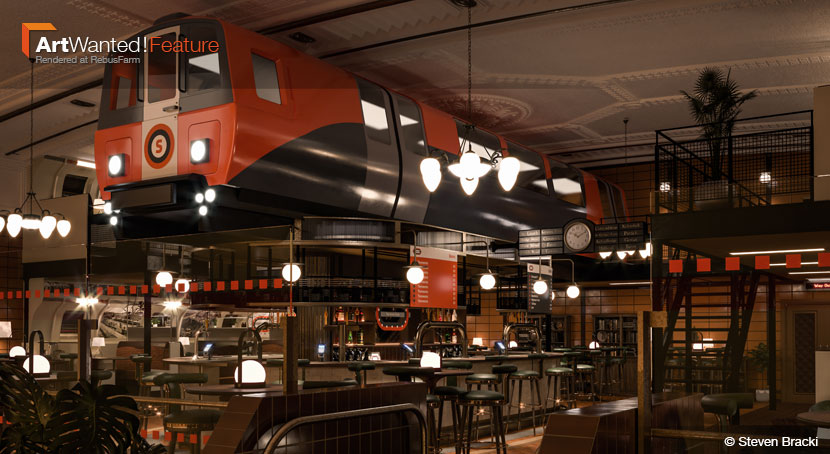
All aboard! We’re bound for Glasgow, Scotland, where talented 3D visualization artist Steven Bracki takes us on a tour to the elusive ‘Inner Circle’. Based on the city’s famous subway system, the digital speakeasy bar features clever thematic designs all throughout its detailed interiors. If you’re looking to quench your thirst for expert conceptualization, lighting and texturing, you’ve come to the right place. Take a seat and join us for a chat, drinks are on the house!
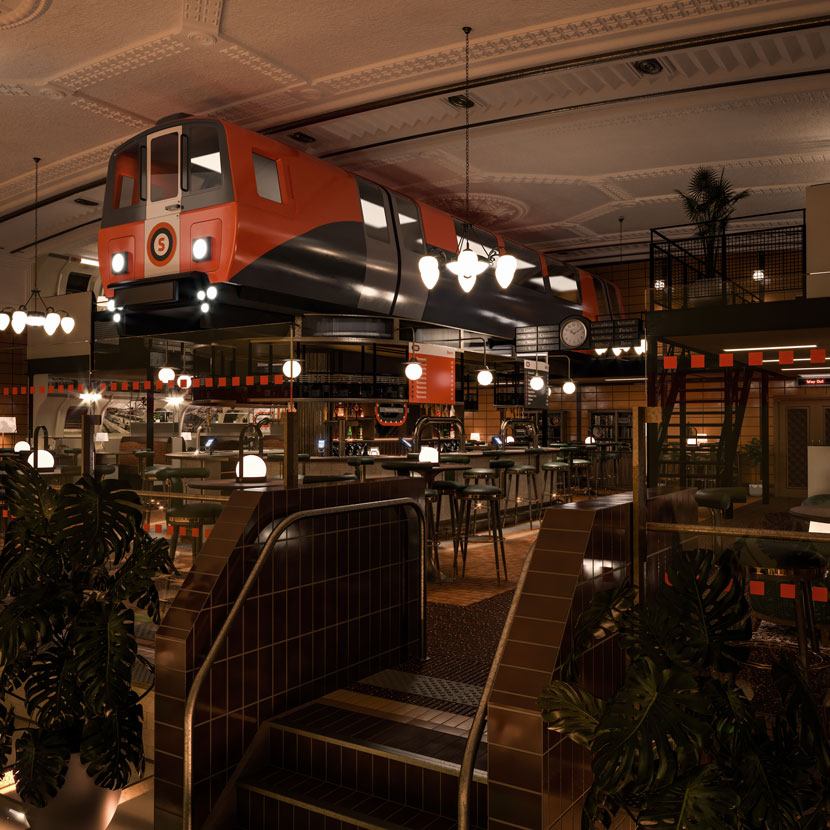 Steven Bracki, ‘The Inner Circle’
Steven Bracki, ‘The Inner Circle’
Hi Steven, thanks for joining us. To start things off, please introduce yourself to our readers!
Hi everybody, my name is Steven Bracki, I am a 25-year-old 3D artist from Glasgow, Scotland.
Do you recall when and how you first consciously encountered CGI?
I first found out about CGI and the world of 3D when I was at school. I took a design class and started to teach myself Google SketchUp and Autodesk Inventor. However, at that point I still wasn’t even sure what a render engine was!
When and why did you decide to pursue a professional career as a 3D artist?
After a few years of playing around with different 3D software, I had a choice to make between studying Product Design or 3D Computer Animation. I chose 3D Computer Animation because, in all honesty, I thought it looked much more fun! So naturally, after graduating from the course, I decided to pursue a career in it.
What training or education do you have?
I have a degree in 3D Computer Animation from Glasgow Caledonian University. I have also completed an Escape Studio course that focused on VFX clean up techniques using Nuke.
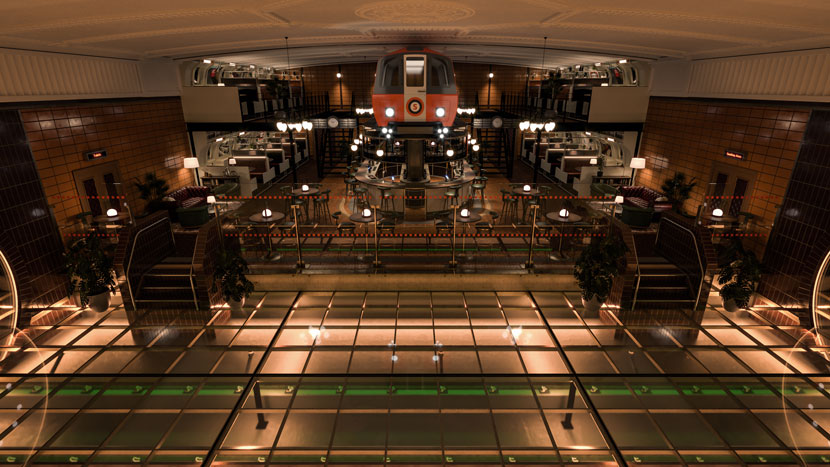 This shot offers an overview of the space.
This shot offers an overview of the space.
Please tell us more about your current job at Soluis!
SoIuis is a Glasgow based visualization studio. I specifically work within the real-time team where I use Unreal Engine to produce a whole variety of different outputs including animation, images, and interactive experiences. I like to split my own time between both real-time and traditional CG methods.
Who are your clients and target markets?
Our clients range from residential developers, to universities, architects, and football teams.
How are you holding up in these trying times? Has the current crisis impeded your work?
I’m holding up well, I have been on furlough for three months with the UK’s Coronavirus Job Retention Scheme but have continued to work on both personal and freelance projects as a replacement.
What were some of your personal highlights or projects you particularly enjoyed in your career thus far?
Out with the recent success of ‘The Inner Circle’ project, winning the NVIDIA Edge award in 2018 for my work in Unreal Engine was a personal highlight. With my job at Soluis, I have also been fortunate enough to work on jobs with Tottenham Hotspur FC, Everton FC and more; given that I’m a football fan, I find these jobs the most fun to work on.
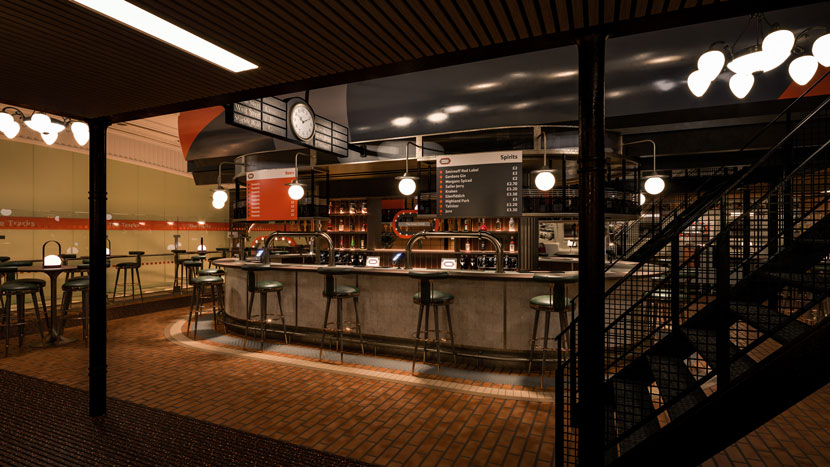 Slàinte Mhath! A closer look at the bar at the heart of ‘The Inner Circle’.
Slàinte Mhath! A closer look at the bar at the heart of ‘The Inner Circle’.
Being mostly focused on the architecture and automotive industry, can you describe your fascination for these two fields?
I think my fascination lies within the variety between the two different fields. Whilst there is some overlap in the techniques used to visualize both areas, the 3D content itself is quite different.
I was first drawn to archviz when I got my job with Soluis. At the time, archviz in Unreal Engine was starting to take off and I liked the challenge of trying these new methods. When it comes to cars, I have found the same trend taking place with the real-time automotive industry and I wanted to explore that. Furthermore, when it comes to product visualization, I think cars are at the forefront of that sector.
Talk to us about similarities and difference in how you approach projects for these respective industries. Is there a big overlap in the skill set required compared to the unique challenges they present?
I think when it comes to visualization, both industries share similar methods and once I determine what workflow to use, I’ll initially approach them in the same way. I think they start to differ when it comes to the output of the project. Archviz can require you to work with a client to produce images and animations, automotive advertisements can be stricter about being “on brand” and a lot of this brand development is done before visualizations are even started.
Is there a specific part of your work you enjoy the most?
I really enjoy creating high resolution content that shows off the fine detail in the materials and lighting I have developed in my work. Furthermore, if it is a product visualization, I love seeing my work go one step further and fit in seamlessly with the overall branding of a company.
Is there a specific design philosophy or architectural school of thought you adhere to? What inspires you as a 3D artist?
My main source of inspiration is seeing what other artists and designers produce, that always pushes me to improve and take my work to the next level.
Regarding my school of thought, I usually get quite eager to jump into things once I have a project in mind. However, I think it is also important to exert some patience and take time to plan it out so that I have a general idea of the direction I’m taking things.
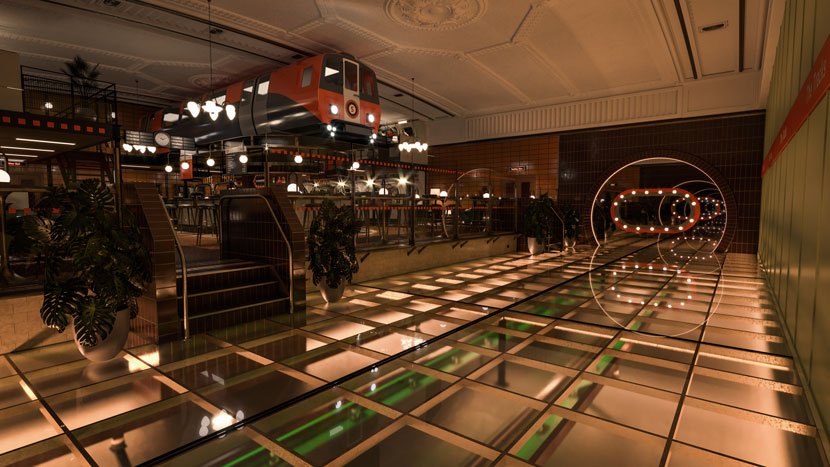 Between the subway tracks, the glass floor, the wall tiles and the elegant ceiling, Steven’s material list for the textures in this shot alone was quite long.
Between the subway tracks, the glass floor, the wall tiles and the elegant ceiling, Steven’s material list for the textures in this shot alone was quite long.
Let’s talk about your work in more detail, namely your submission to our campaign, ‘The Inner Circle’, a fully fleshed out concept for a bar themed around the Glasgow subway. Can you first describe the concept in more detail? How did you come up with the original idea?
I first had the idea around two years ago, when I was trying to come up with some interesting things I could visualize. When I started looking at the Glasgow subway, I thought about how the seats could be turned into booths and from there I had the idea about creating a Glasgow subway themed bar.
As someone not exactly familiar with the Glasgow subway, I assume the name of the bar and the stations on the display are allusions to a particular line?
When it comes to the Glasgow subway, a lot of people say it’s one of the easiest subway systems in the world. It’s just one loop with two ‘circles’, Inner Circle and Outer Circle, so even if you get on the wrong one, you’ll still get to your stop eventually! I wanted the bar to feel hidden, like a speakeasy, and I felt like ‘The Inner Circle’ name played into that theme perfectly.
Once you had a rough concept in mind, how did you then go about realizing the idea? Can you walk us through the development process step by step?
For me, the important part was working out what the rough concept would look like, so it was less foggy in my mind. So, once I came up with a list of core ideas that I wanted to feature in the bar, I then used them to piece the space together. After I had done this, I focused on one core idea at a time, with the booths being my starting point. I used a color palette and lighting to help blend each of the core ideas together and make the bar feel like one big space.
How long did it take you to complete the project?
It took roughly six weeks overall from start to finish, including weekends.
What were some of the challenges you had to overcome? What parts of the image were especially important to you?
The biggest challenge was the interior design. I’m not an interior designer and there were definitely a few times during the project where I almost stopped working on it, as I didn’t think the design was working the way I wanted it to. The interior design was also especially important to me, I wanted people to look at the images and feel like the bar worked as a space. The design relied on the Glasgow subway theme a lot, but I wanted to make sure it all served a function. I was fortunate enough to have some colleagues that would give honest feedback on what worked and didn’t work.
What has the feedback been like and how satisfied are you with the results yourself?
I was really happy with the results, especially with some of the materials in the scene. There’s a lot of detail in the images that you can zoom in on if you have the high-resolution versions. The feedback was phenomenal, I wasn’t expecting the project to go viral. I think because the UK was in lockdown and bars were closed at the time, it was a welcomed sight for a lot of people.
What software did you use to create the ‘The Inner Circle’? Any plug-ins you found particularly helpful?
I used 3ds Max, Corona Renderer and Photoshop. I created most textures from scratch and sourced some from Poliigon.
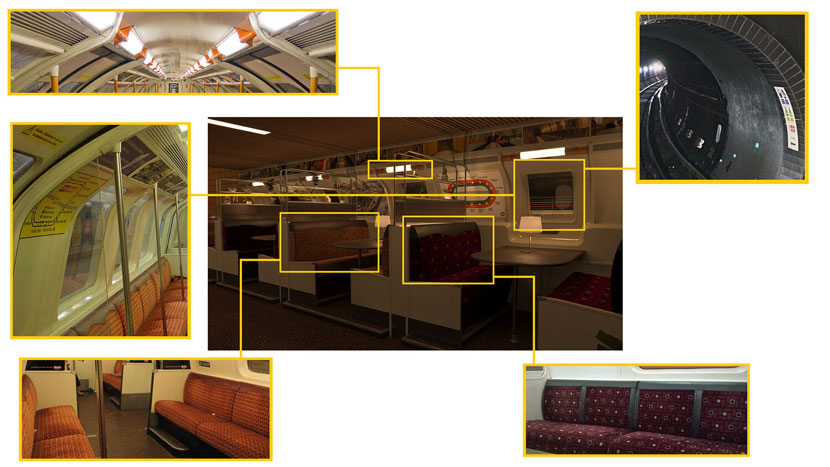 Reference material for the booths. Check out Steven’s detailed a href="https://www.stevenbracki.com/blog/the-inner-circle-project-breakdown" target="_blank" rel="noopener noreferrer">making-of for more!
Reference material for the booths. Check out Steven’s detailed a href="https://www.stevenbracki.com/blog/the-inner-circle-project-breakdown" target="_blank" rel="noopener noreferrer">making-of for more!
With how much thought and effort you put into this project, do you sometimes regret that it only exists in a virtual capacity, at least for now? If you could patronize ‘The Inner Circle’ in real life, what drink would you order and where would you sit?
I do a bit, but that’s not my area of expertise so I can’t say too much about whether it would be viable as a business in real life. However, I can say that I would sit in the Kelvinbridge booth with a whisky in one hand and a pint of beer in the other!
What is your main motivation when doing personal projects?
I think it’s important to do personal projects and I have many motivations behind that thought. One of my main ones is keeping up with this fast-paced industry as methods and workflows are always changing.
Sometimes my projects are more focused on creative expression (like ‘The Inner Circle’) and sometimes they involve a specific skill I want to get better at. I usually pick personal projects based on whatever it is I want to do at the time, but if you can find a project that has the right balance between creative expression and honing your skills, then that’s a bonus!
How do you make time for these kinds of projects?
Generally, I get up early and stay up late, I also work on projects at the weekend too. The workload can pile up quickly so that’s why I like to do projects that are a bit different from what I do in my daily job. I think it’s important to manage your own expectations and goals when it comes to personal projects, as the time you spend on it will be more split up if you work full-time.
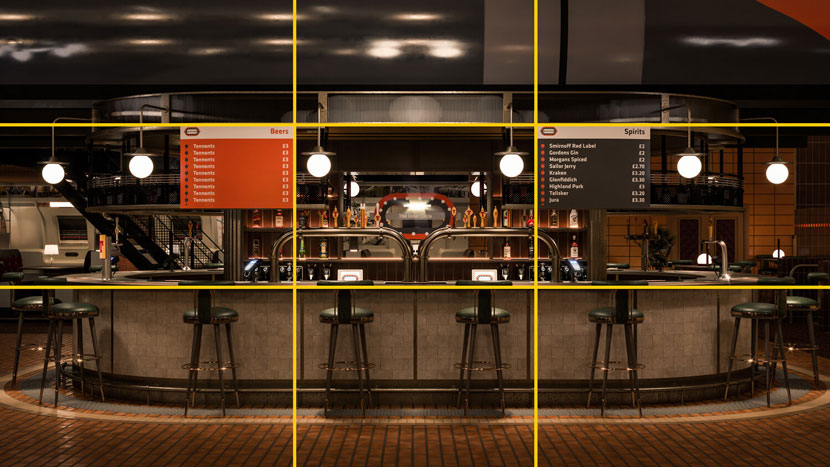 This breakdown illustrates how Steven made use of the rule of thirds to create camera compositions.
This breakdown illustrates how Steven made use of the rule of thirds to create camera compositions.
Please tell us more about your previous experience with RebusFarm. Is there anything you especially like about our service?
This was my first time using RebusFarm. The company I work for uses it a lot, so when I had 10+ images to render out at 5k resolution I decided to give it a go. I really liked the RebusFarm application for 3ds Max and being able to batch upload multiple renders at once.
In closing, is there anything else you want to say? Any present or upcoming projects you’d like to mention?
Lastly, I’d like to say thank you for getting in touch to have a chat about my project!
The pleasure is all ours! Steven, thank you very much for taking the time and all the best in the future!
Keep up with Steven Bracki and his work here:
How to join ArtWanted!
You want to get featured in our ArtWanted! campaign and win 250 RenderPoints on top? Submit your work, rendered at RebusFarm, to This email address is being protected from spambots. You need JavaScript enabled to view it.! Visit our Art Wanted! page for more information.
>> Read more articles on our blog
